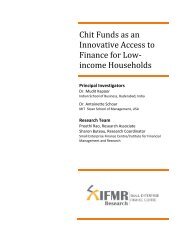Government of India Volume I: Analysis and Recommendations
Government of India Volume I: Analysis and Recommendations
Government of India Volume I: Analysis and Recommendations
Create successful ePaper yourself
Turn your PDF publications into a flip-book with our unique Google optimized e-Paper software.
FOUNDATIONS OF CONTRACTS AND PROPERTY<br />
Table <strong>of</strong> <strong>Recommendations</strong> 13.1 Insurance contracts<br />
With respect to insurance law, the Commission recommends:<br />
1. Consumers must have a duty <strong>of</strong> good faith obligation towards the insurer;<br />
2. The regulator should be able to make an insurable interest m<strong>and</strong>atory for only specified types <strong>of</strong> insurance<br />
contracts;<br />
3. The law should allow free assignment <strong>of</strong> insurance contracts subject to anti-fraud restrictions placed by the<br />
regulator;<br />
4. Adequate consumer protection regulations should be placed in the law requiring notice <strong>of</strong> impending default<br />
<strong>of</strong> insurance contracts due to non-payment <strong>of</strong> premium; <strong>and</strong><br />
5. The duties <strong>of</strong> the insured <strong>and</strong> the insurer in the various events arising out <strong>of</strong> subrogation must be clearly<br />
stated in law, in accordance with relevant Supreme Court rulings.<br />
Table <strong>of</strong> <strong>Recommendations</strong> 13.2 Defining securities<br />
To define securities, the Commission recommends:<br />
13.2.2. Securities<br />
1. Securities must be defined in two parts;<br />
2. The first part is the test <strong>of</strong> a freely transferable financial interest.<br />
3. The second part is an illustrative list <strong>of</strong> securities;<br />
4. The government should be allowed to add more securities to the illustrative list <strong>and</strong> financial markets develop<br />
<strong>and</strong> the innovation creates new securities.<br />
Defining what constitutes securities has been a challenge in many jurisdictions. The Commission<br />
found that the test depends on the free transferability <strong>of</strong> the instrument which<br />
leads to the creation <strong>of</strong> markets. Table 13.2 provides the recommendations <strong>of</strong> the Commission<br />
on defining securities.<br />
Financial derivatives contracts are transactions, where parties agree that one party<br />
will pay the other a sum determined by the outcome <strong>of</strong> an underlying financial event such<br />
as an asset price, interest rate, currency exchange ratio or credit rating. Such contracts<br />
help in raising <strong>and</strong> allocating capital as well as in shifting <strong>and</strong> managing risks. Derivative<br />
contracts may be exchange traded or non-exchange traded, the latter being referred to<br />
as OTC. They may be st<strong>and</strong>ardised or non-st<strong>and</strong>ardised.<br />
At the moment, there are certain complexities in enforcing derivative contracts. Section<br />
30 <strong>of</strong> the <strong>India</strong>n Contract Act, 1872 renders all wagering contracts void. Financial<br />
derivatives may be rendered unenforceable because <strong>of</strong> this provision. Exceptions to this<br />
rule have therefore been carved out through special legal provisions. Section 18A <strong>of</strong> the<br />
Securities Contracts (Regulations) Act, 1956 <strong>and</strong> Chapter III-D <strong>of</strong> the Reserve Bank <strong>of</strong> <strong>India</strong><br />
Act, 1934 (introduced by the RBI Amendment Act, 2006) are examples <strong>of</strong> such special<br />
provisions. The Commission is <strong>of</strong> the view that for legal certainty in the enforceability <strong>of</strong><br />
financial derivatives, an exception to the general application <strong>of</strong> section 30 <strong>of</strong> the <strong>India</strong>n<br />
Contract Act, 1872 must be clearly specified in the law in a more general way.<br />
The Commission has reviewed the question <strong>of</strong> requiring central clearing <strong>of</strong> OTC derivatives.<br />
Internationally, after the financial crisis in 2008, there has been a marked shift in<br />
favour <strong>of</strong> centrally cleared OTC derivative trading. In light <strong>of</strong> the positions taken by the G-<br />
20, both the European Union <strong>and</strong> the United States (US) have moved towards a regulatory<br />
framework for OTC derivatives trading that encourages central clearance. The Commission<br />
recommends that the regulator should have sufficient discretion to authorise such<br />
a position as <strong>and</strong> when required.<br />
The Commission also reviewed the issue <strong>of</strong> inheritance <strong>of</strong> securities <strong>and</strong> other financial<br />
products. It found that the issues <strong>of</strong> inheritance should not create undue burdens<br />
on intermediaries who hold securities on behalf <strong>of</strong> the deceased. For example, property<br />
FINANCIAL SECTOR LEGISLATIVE REFORMS COMMISSION 121



